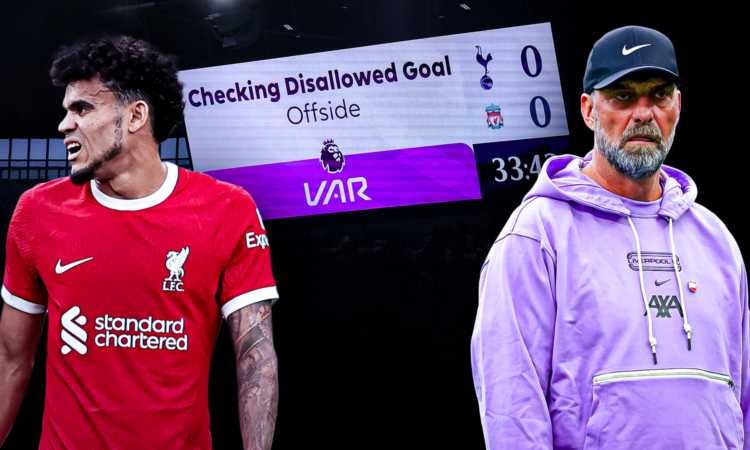VAR: Premier League claims 96 per cent of referee decisions are correct – so what is future of technology in football? – Sky Sports

Football
The Premier League claim the “majority” of supporters are in favour of VAR and the technology has led to a 14 per cent increase in correct decisions; Sky Sports senior reporter Rob Dorsett sits down with Tony Scholes to discuss VAR’s performance and ideas for improvement
Senior Reporter, Sky Sports News @RobDorsettSky
Thursday 8 February 2024 14:14, UK
Please use Chrome browser for a more accessible video player
The Premier League has admitted there have been 20 wrong VAR decisions this season but insists, according to a new survey, the “majority” of supporters are in favour of the technology – which they claim has led to a 14 per cent increase in correct decisions.
The details of that survey, conducted by the Premier League themselves, have not been made public, but Tony Scholes, the Premier League’s chief football officer, sat down with senior reporter Rob Dorsett to discuss VAR’s performance this season and plans to improve technology.
The latest Premier League statistics show before VAR was introduced, 82 per cent of refereeing decisions were correct. Now, since VAR was introduced, 96 per cent of decisions are correct.
“VAR is, and remains, a very effective tool in supporting the match officials on the pitch,” Scholes says.
Two years ago, the Premier League set up an independent key match incidents panel (KMI panel), which assesses all the big decisions made by referees in every Premier League game.
The panel is made up of former players, former coaches and referees, who report their opinions so the Premier League and the Professional Match Game Officials Limited (PGMOL) can improve standards.
“The purpose of that panel is to analyse and take a view on every key decision made by the match officials in every single one of the 380 games,” Scholes explains.
Get Sky Sports on WhatsApp!
Live Premier League table
Stream Sky Sports on NOW
Download the Sky Sports App
“The output of that analysis is used to help coach the referees, to help give PGMOL management a view as to where the game, as represented by these former players and coaches, doesn’t agree with the approach that the referees are taking.”
Please use Chrome browser for a more accessible video player
Scholes is adamant the panel’s conclusions, having reviewed all of the refereeing decisions in the top division, proves VAR has improved decision-making since it was introduced for the 2019/20 season.
This season, the KMI panel has decided:
We asked you for your thoughts on the biggest changes VAR needs – here’s what you had to say…
Roger: Drop the ‘clear and obvious’ tag and replace with rugby union’s ‘is there any reason why I can’t allow this try/goal?’
Jboi6!: If the ref doesn’t deem it a serious error then it shouldn’t go to VAR. Also if someone’s shoelace is offside it shouldn’t be a problem – It wasn’t five years ago.
Shaun: VAR needs to be consistent, after this season they need to drastically improve decision making involving VAR or scrap it completely. I’ve preferred watching the FA cup games without VAR, it’s back to real football.
Matt L: I’d change it to a ‘challenge’ system. Both teams have 2 challenges and can use 1 per half. They challenge a call that wasn’t given and VAR check it, like tennis.
Yes. Scholes says there are two major issues he wants to see addressed with VAR going forward.
“These two elements, I believe, affect the whole reputation of VAR. The first is the amount of time it is taking to check decisions.
Please use Chrome browser for a more accessible video player
“We are doing too many checks, we’re taking too long in doing them as well. It’s to a degree understandable, given the level of scrutiny these guys are under. But the reviews are taking too long and it’s affecting the flow of the game and we’re extremely aware of that and the need to improve that speed while always maintaining the accuracy.”
The second area is the “in-stadium experience” for supporters, which Scholes says simply is not good enough.
“It’s nowhere near good enough. We know it’s not. It affects supporters’ enjoyment of the game and we know it needs to change.”
But Scholes goes on to say the Premier League’s major frustration is that it is powerless to change this.
“We’re constrained by IFAB at the moment,” he laments. “IFAB are very clear on their rules as to what we can and can’t say, both during the VAR process and post the VAR process. We cannot play the audio.
“My personal view is we’re on a journey and that we’ll get to a point where both the video and the audio is played live and then played again afterwards to explain the decision.
Please use Chrome browser for a more accessible video player
“How far we are away from that, I don’t know. That’s not in our hands. That’s decided by IFAB. But we will continue to lobby them to get to a place where VAR is as open, transparent and informative to supporters and all stakeholders as it is possible to do.”
Scholes has revealed for the first time both the Premier League and PGMOL have begun a new project, aimed at identifying future specialist VARs already working as referees further down the football pyramid.
“PGMOL is identifying referees, who are perhaps operating in the EFL or the National League, who they believe have got the attributes required in order to be a good VAR.
“Those people who are then selected will go through a training programme with the intention of developing a group of specialist VARs to supplement, not replace, those members of the select group who at the moment operate very effectively as VARs, as well as on the pitch.”
Scholes says there are plans to introduce it, but it may not be in place for the start of next season.
At the moment, two separate systems are being trialled, but he says there are technical concerns with both.
When a number of players are between the cameras and the ball, there have been some decisions where it has been hard to identify whether a specific body part is that of an attacker or a defender.
Scholes says until those concerns are completely eradicated, the Premier League will not consider introducing it.
“It’s what we call the edge cases. So those cases where many things are occurring at once, you might have a lot of bodies in one place, and it’s the ability of the system to identify different parts of the body.
“For the vast majority of cases, there won’t be an issue. But we want to be clear in our competition before we introduce anything that will give us unintended or unanticipated problems in other areas.”
Scholes says if those problems can be ironed out, semi-automated offside technology may be put to clubs to vote on later this year.
You can now start receiving messages and alerts for the latest breaking sports news, analysis, in-depth features and videos from our dedicated WhatsApp channel!
Find out more here…
Correctly predict six scorelines to win £250,000 for free with Super 6. Entries by 3pm Saturday.
© 2024 Sky UK






